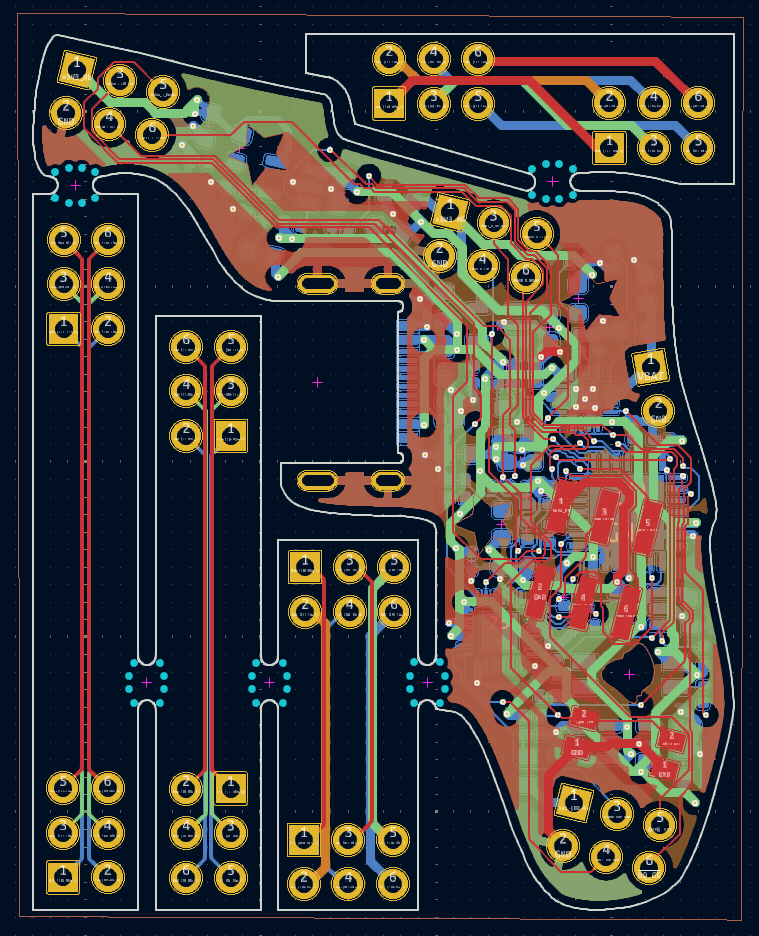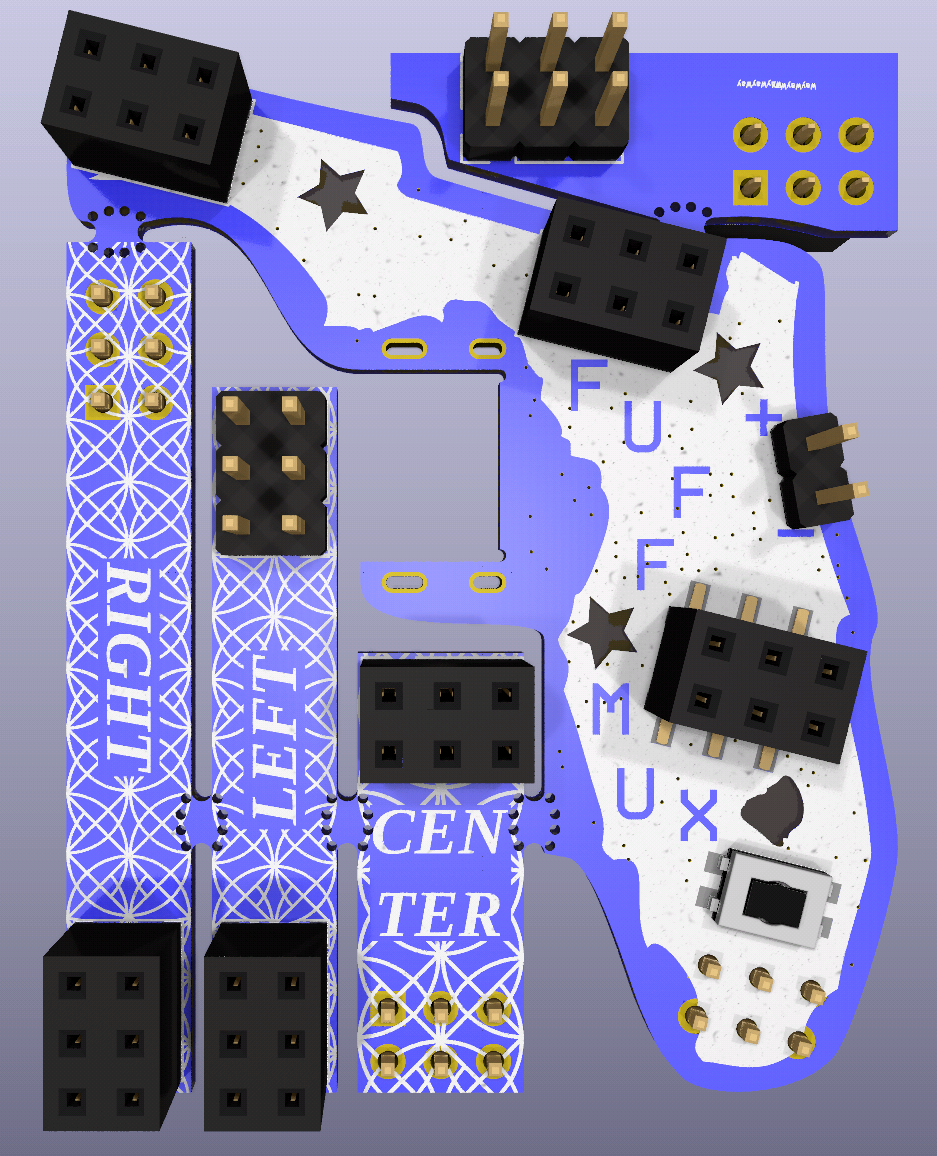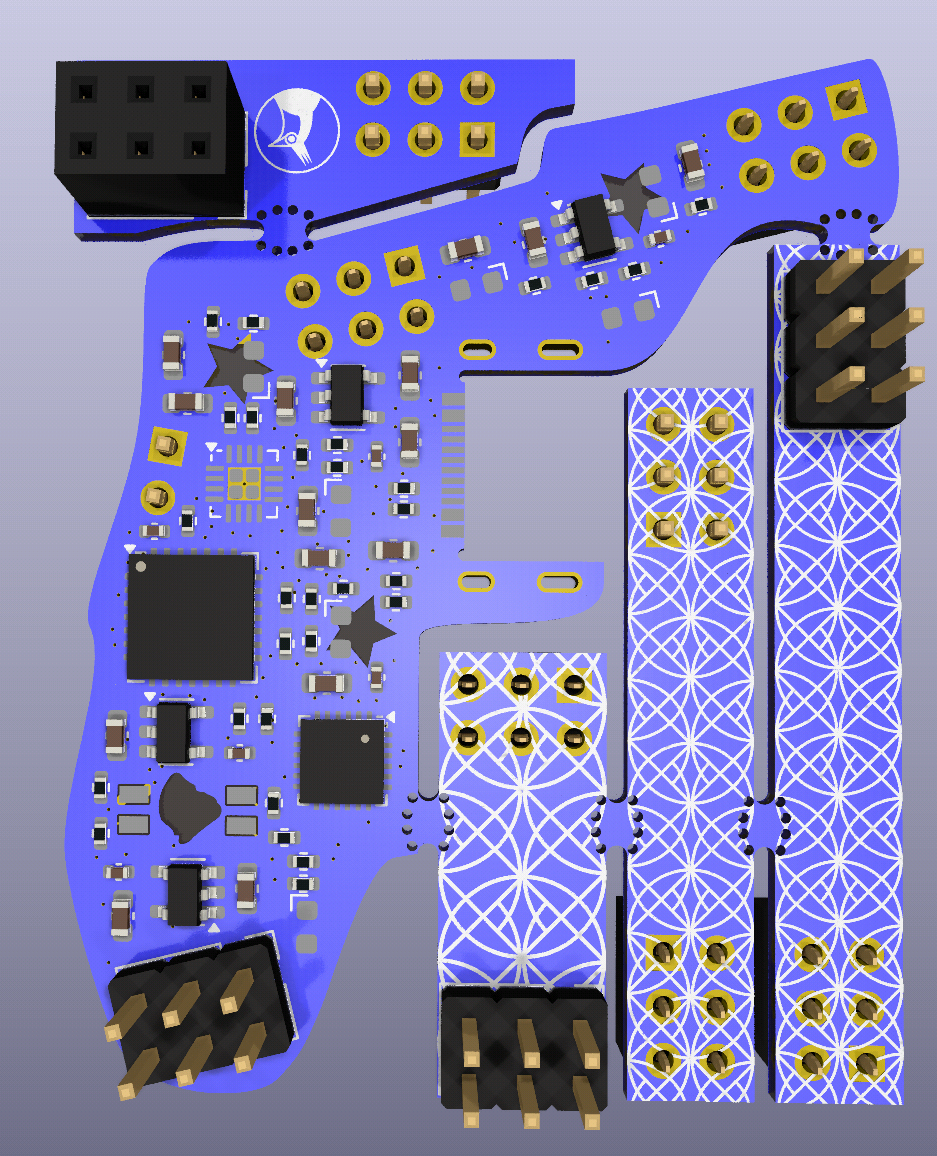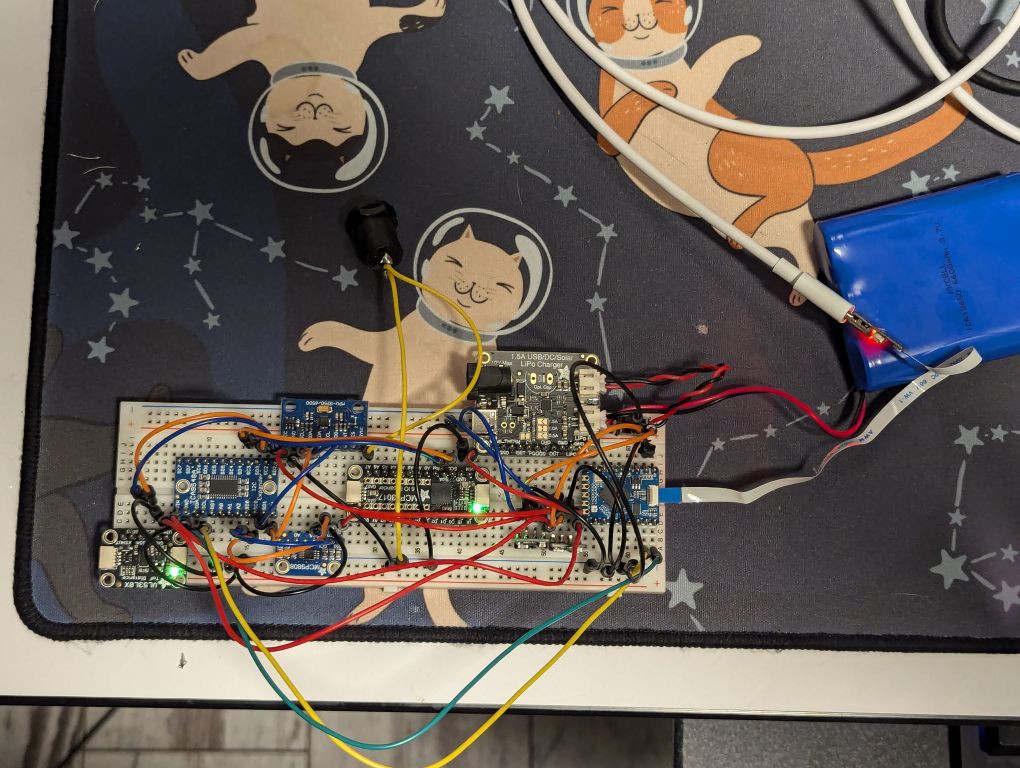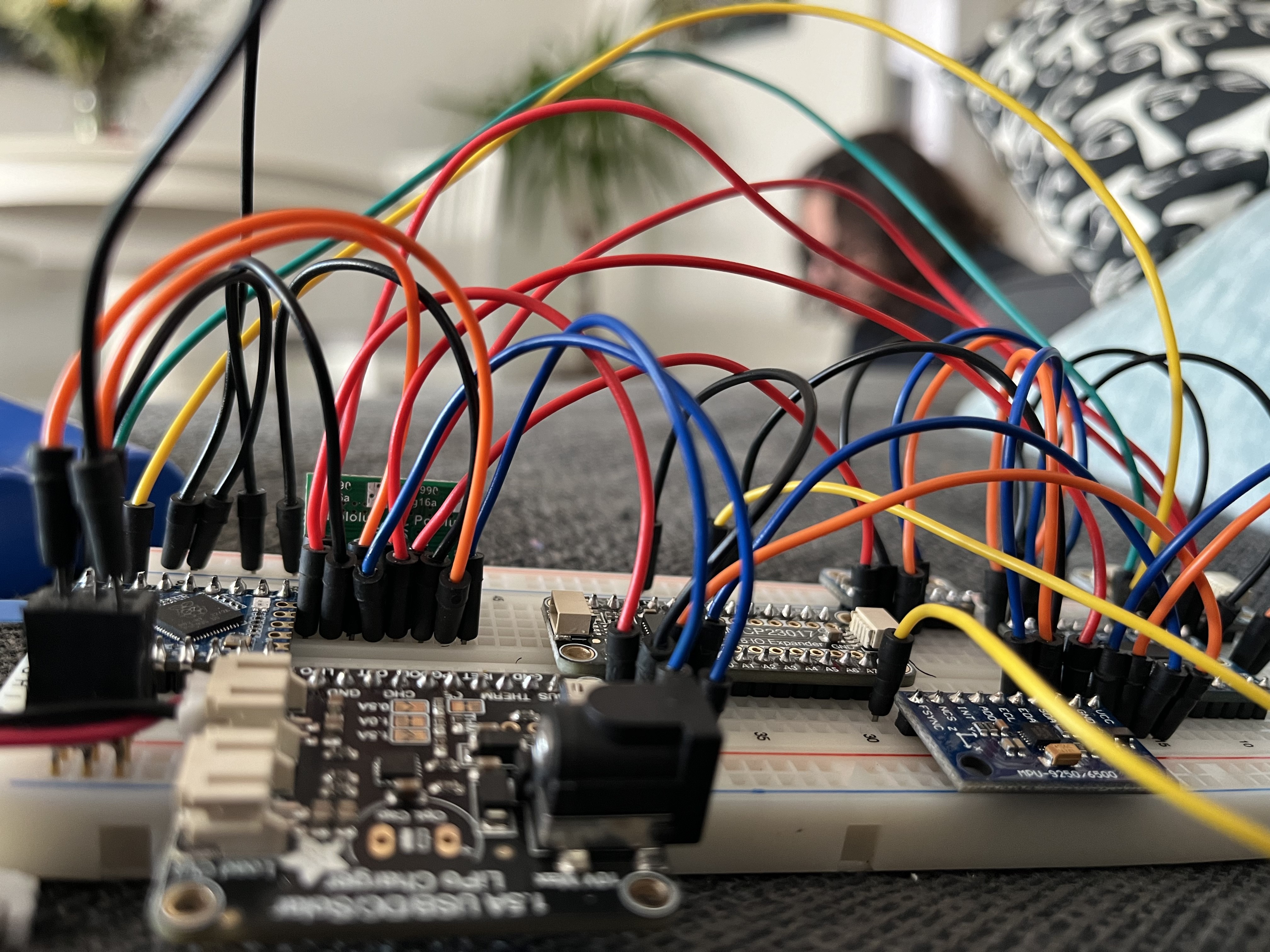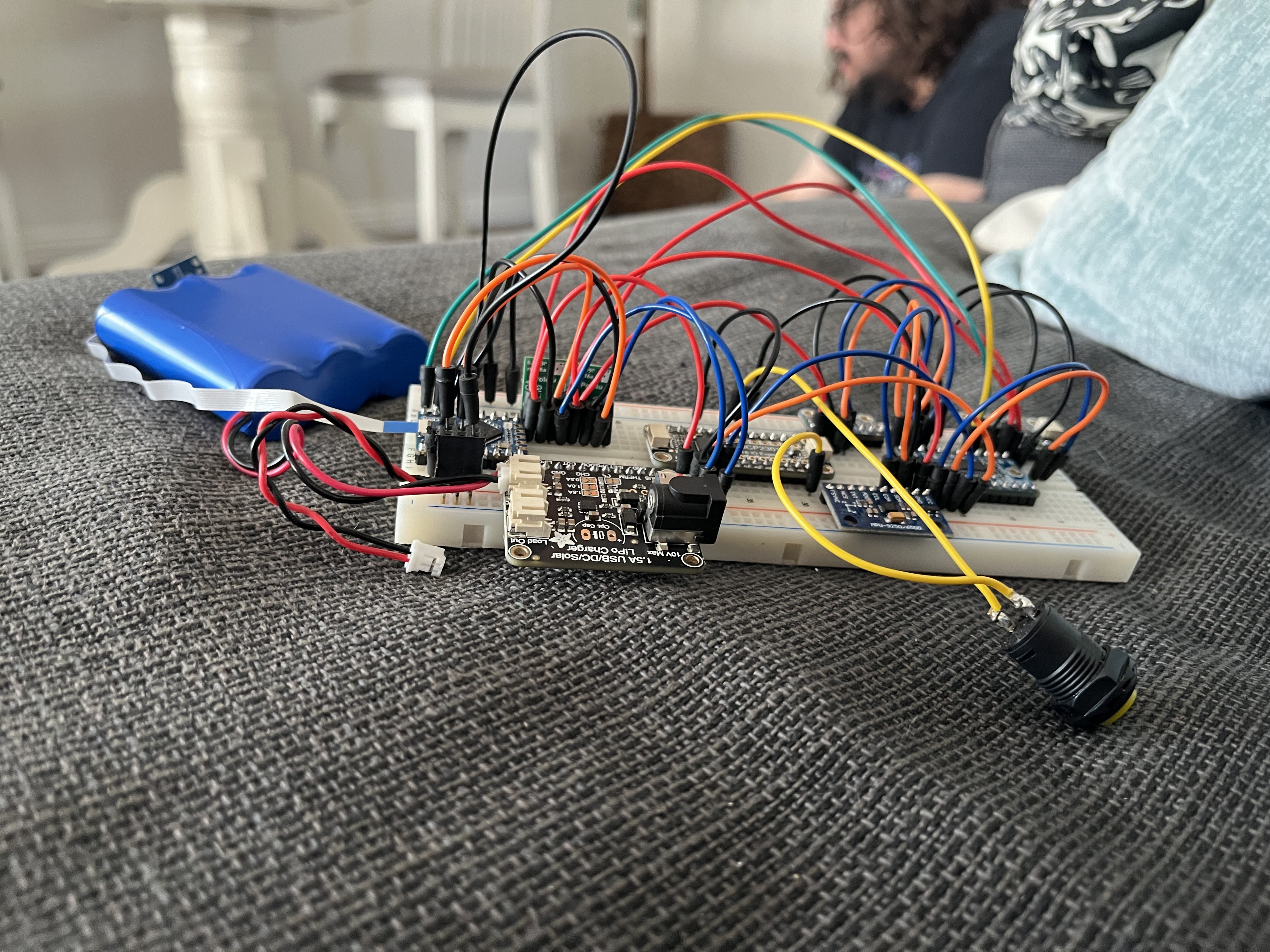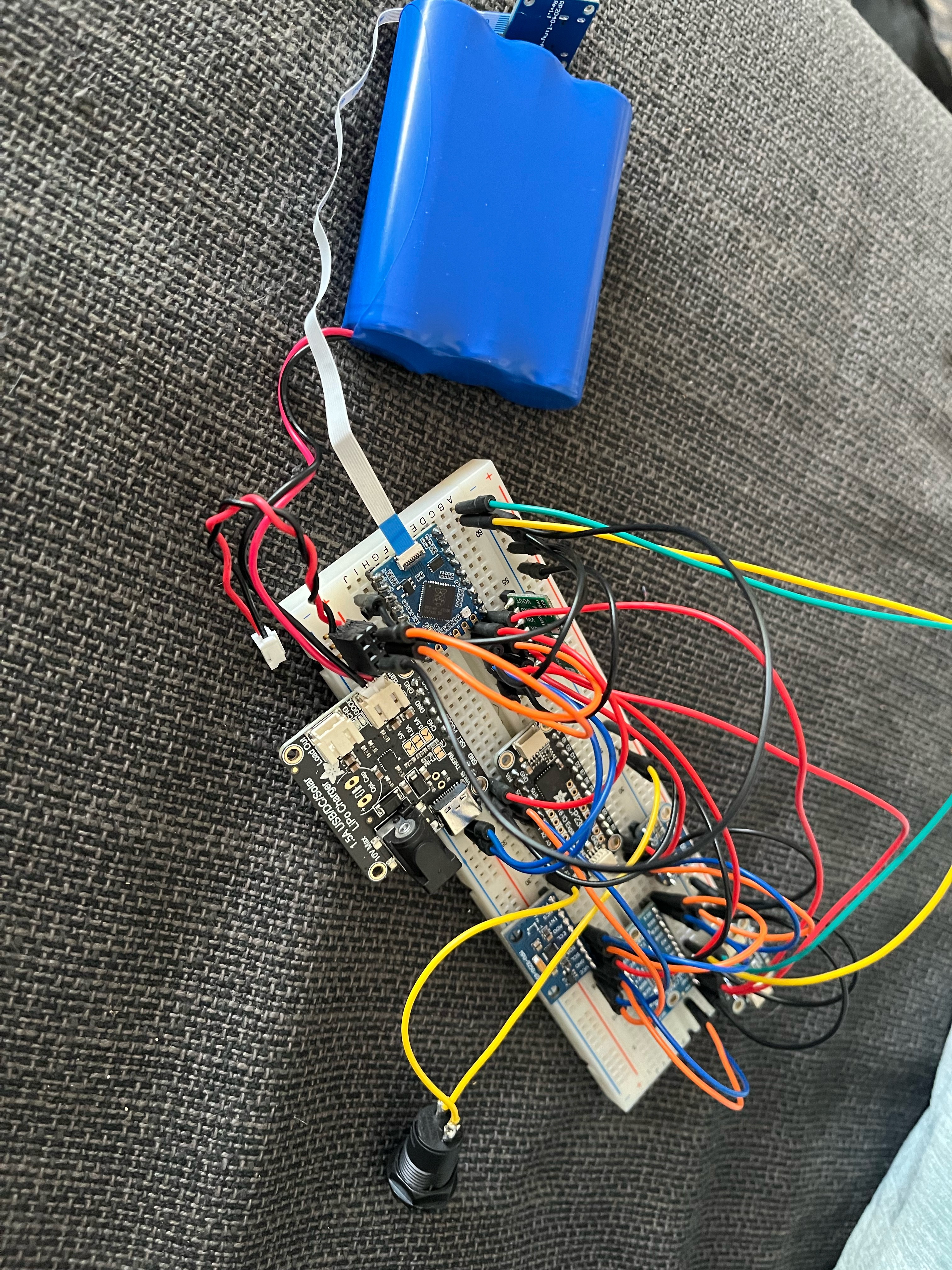-
Supercon 8, Baby!
11/03/2024 at 19:44 • 0 commentsThe FUFF MUX is real and in the flesh (kinda)! I asked PCBWay to express ship the boards to Pasadena and they made it just in time for the con. I also got a bunch of parts in from Digikey and got to work putting together the first one on Friday during the badge-hacking and party on Friday.
I spent some time on Saturday finishing up the first one (removing shorts and whatnot) but before I could make any more, the hot plate managed to melt its own temp controller and died lol
I went to LACM after to enjoy some talks and continued FUFFin away. Now to see where we get to on sunday.
Pics incoming. I was having some technical difficulties getting them uploaded.
-
Update [Oct 14, 12:51 PM PDT] - Fabulous Fabrication (Redux)
10/15/2024 at 05:17 • 0 comments![]()
![]()
![]()
Board files have been successfully submitted to PCBWay for approval and fabrication. With the demo code working and the design off to manufacturing, I'm satisfied that I have done everything I can to meet the minimum requirements for contest qualification. Still, there are many things to do in preparation for the boards arriving:
- Clean up the Git repo and upload the design files there and here
- Order the parts (now that they're all available for purchase)
- Work on the docs
- Make a few "set-and-forget" example programs (based on the existing demo code) in MicroPython, CircuitPython, and Arduino C++
- Make a video on the FUFF MUX
- Create an item on Tindie
These are all good stretch goals for Supercon. Even if the FUFF MUX doesn't win the contest, it'll still be for sale :]
-
Update [Oct 12, 11:48 PM PDT] - The (breadboard) FUFF MUX Lives!!!
10/15/2024 at 03:25 • 0 commentsThe FUFF MUX works as designed. I breadboarded each of the ICs included on the PCB, as well as three different I2C devices I had in my parts box:
- FUFF MUX
- 3.3V regulators (the breadboard used the D36V6F3 instead of the SPX3819M5-L-3-3)
- BQ24074 - Battery charger
- MCP23017 - GPIO expander
- TCA9548A - I2C multiplexer
- External Devices
- MCP9808 - temperature sensor
- MPU9250 - combined 3-Axis gyroscope / 3-Axis accelerometer with a separate AK8963 3-Axis magnetometer on the same die
- VL53L0X - ToF lidar sensor
- RP2040-Tiny - main controller for I2C devices
Here are some fun pics of the breadboard in all its messy glory:
![]()
![]()
![]()
![]()
This is the `main.py` file I wrote, but the Git commit with library submodules is coming soon.from machine import UART, Pin, I2C, Timer from micropython_mcp9808 import mcp9808 from mpu9250 import MPU9250 from ak8963 import AK8963 import VL53L0X import mcp23017 import tca9548a import time, utime ''' TODO: Yaks to shave: - [x] Proof of life from Pico by enumerating U2F drive on laptop and accepting a compiled program - [x] Serial communication - UART0 is Bogarted by Thonny so we have to use UART1 for traditional USB-serial comms - [x] I2C hello world - do a scan and see at least one device at the expected address - [x] I2C Read and write MCP9808 temp sensor (at least individually) - [x] I2C Read and write MPU9250 IMU sensor (at least individually) - [x] I2C Read and write VL53L0X ToF sensor (at least individually). Don't forget to remove the P&P Kapton Meat & Potatoes - [x] I2C Read and write TCA9548A I2C Mux (at least individually) - [x] I2C Read and write MCP23017 GPIO expander (at least individually). Consider switches - [x] I2C read & write through multiplexer ''' uart1 = UART(1, baudrate = 115200, tx = Pin(4), rx = Pin(5)) i2c0 = I2C(0, scl = Pin(1), sda = Pin(0), freq = 100000) i2cmux = tca9548a.TCA9548A(i2c0) def test_ext_uart_mon(): print("test_ext_uart_mon: Testing UART transmission to external serial monitor...") txData = b'hello UART, from RP2040!\n\r' uart1.write(txData) print(txData) print("test_ext_uart_mon Complete") print() def test_i2c_scan_chain(): print("test_i2c_scan_chain: Testing I2C read capabilities:") print("Devices on I2C0: ") print(" ".join(hex(n) for n in i2c0.scan())) print("test_i2c_scan_chain Complete") print() def test_temp_sensor(): print("test_temp_sensor: Testing MCP9808 temperature sensor writing and reading") temp = mcp9808.MCP9808(i2c = i2c0, address = 0x18) for tempres in mcp9808.temperature_resolution_values: print(f"Writing temperature resolution setting: {tempres}") temp.temperature_resolution = tempres print("Reading temperature resolution setting: ", temp.temperature_resolution) for sample in range(10): print(f"Reading temperature {sample+1}/10: {temp.temperature:.4f}°C") time.sleep(0.2) print("test_temp_sensor Complete") print() def test_imu(): print("test_imu: Testing MPU9250 IMU writing and reading") dummy = MPU9250(i2c = i2c0) print(f"Reading MPU9250 id: {hex(dummy.whoami)}") print(f"Writing calibration info for magnetometer") ak8963 = AK8963( i2c0, offset=(-136.8931640625, -160.482421875, 59.02880859375), scale=(1.18437220840483, 0.923895823933424, 0.931707933618979) ) imu = MPU9250(i2c = i2c0, ak8963 = ak8963) for sample in range(10): print(f"Reading MPU9250 Sensors {sample+1}/10") print(f"Accel: {imu.acceleration}") print(f"Gyro: {imu.gyro}") print(f"Mag: {imu.magnetic}") print(f"Temp: {imu.temperature}") time.sleep(0.1) print("test_imu Complete") print() def test_tof(): print("test_tof: Testing VL53L0X ToF Lidar writing and reading") tof = VL53L0X.VL53L0X(i2c0) print(f"Writing pulse period info for ToF") tof.set_Vcsel_pulse_period(tof.vcsel_period_type[0], 18) tof.set_Vcsel_pulse_period(tof.vcsel_period_type[1], 14) tof.start() tof.read() for sample in range(10): print(f"Reading ToF Sensor {sample+1}/10: {tof.read()}") time.sleep(0.1) tof.stop() print("test_tof Complete") print() def test_gpio_expander(): print("test_gpio_expander: Testing MCP23017 16-bit GPIO expander writing and reading") gpio_exp = mcp23017.MCP23017(i2c0, 0x20) print("Writing config values") gpio_exp.config(interrupt_polarity=1, sequential_operation=0, interrupt_mirror=1) # A7 is connected to my test switch gpio_exp.pin(7, mode=1, pullup=True) for sample in range(5): print(f"Reading switch {sample+1}/5: {gpio_exp.pin(7)}") time.sleep(1) print("test_gpio_expander Complete") print() while(True): print("Starting FUFF Tests") #test_ext_uart_mon() # disable all 8 channels i2c0.writeto(0x70, b'\x00') test_i2c_scan_chain() # enable channel 0 (SD0,SC0) i2c0.writeto(0x70, b'\x01') test_i2c_scan_chain() test_temp_sensor() #enable channel 1 i2c0.writeto(0x70, b'\x02') test_i2c_scan_chain() test_imu() # enable channel 2 i2c0.writeto(0x70, b'\x04') test_i2c_scan_chain() test_tof() # enable channel 3 i2c0.writeto(0x70, b'\x08') test_i2c_scan_chain() test_gpio_expander() print("FUFF Tests Complete. Restarting in 10s") time.sleep(10) - FUFF MUX
-
Update [Oct 8, 8:32 PM PDT] - OH NO I FUFF'D UP!
10/15/2024 at 02:30 • 0 commentsAfter submitting the board to PCBWay for fab, I realized I made a really dumb mistake. In order to move quickly (and recklessly), I selected an I2C GPIO expander IC with a small footprint: the STMPE1600. I designed the whole damn board before trying to put together the BoM and discovered that this expander is complete and utter unobtanium. It's an obsolete part that has been discontinued by the manufacturer and can't be ordered through the normal channels in any sort of reasonable time frame.
The only reasonable choice I have (and what I should have done at the beginning) was to select a GPIO expander with less supply chain risk. I've decided on the MCP23017 which has a lot of available stock on Digikey, breakout boards, and community support. but the smallest package size is 0.6mm x 0.6mm larger and has a completely different pinout than the STMPE1600.
This requires a significant rework of the board design at a time when I don't have much time to spare! Since the lead time for the PCB is going to be 8-9 days anyway (after the contest deadline), I'm going to pivot to a new strategy that hopefully still meets the submission requirements. I have breakout boards for each IC on the FUFF MUX and will create a breadboard so that I can begin writing software to prove out the functionality of the design ("works like the final design; doesn't look like the final design"). I hope that with the software taken care of and the board redesigned and sent to fab by the deadline, this will acceptably be considered a "working prototype" per the contest rules.
-
Update [Oct 7, 12:47 AM PDT] - The FUFF MUX SAO has a PCB sponsor!
10/15/2024 at 01:32 • 0 comments![]()
Today, Liam from PCBWay reached out to me over the Hackaday.io DMs and offered to have PCBWay sponsor the prototype fab run of the FUFF MUX! I'm very excited about this partnership. I've seen some of the amazing projects that PCBWay has been a part of, as well as some of the cool (and informative) videos they've posted over the years.
I'm still polishing up the PCB design (making silkscreen pretty, squashing some last-minute DRC issues, etc.) but stay tuned for more info as we move toward a sick-awesome custom FUFF MUX board.
-
Git Commit [Oct 5, 2024, 1:02 AM PDT] - Finished routing more or less. Needs some clean up aesthetically.
10/15/2024 at 00:24 • 0 commentsProgressssssss! Dumping all the files and will clean up later. Looking into different board manufacturers.
-
Git Commit [Sep 12, 2024, 12:33 AM PDT] - Finished schematic enough for a review. Generated PDFs for distribution.
10/15/2024 at 00:10 • 0 commentsThe schematic is done! Also had to invert the soldermask on the SVG - any objects on the *.Mask layers tell Kicad where to REMOVE solder mask material. This is in contrast to the *.Silk layers where any items on it tell Kicad where to ADD silkscreen ink.
-
Git Commit [Sep 11, 2024, 11:52 AM PDT] - Trivial changes to test RSS feed in element
10/14/2024 at 23:50 • 0 commentsVery minor update. Since the main chat for this project is on Matrix, I wanted to add updates to the room using the RSS feed provided by Codeberg. This commit tests the Feed Bot
-
Git Commit [Sep 11, 2024, 11:46 AM PDT] - Added more connections to the top sheet w/ hierarchical pins, added more notes to clarify how project is organized, cleaned up the project to reduce some visual clutter
10/14/2024 at 23:37 • 0 commentsJust a checkpoint update to help clear up some messy schems
-
Git Commit [Sep 10, 2024, 10:42 PM PDT] - Removed spurious Gingerbread files, added per-layer exports from Inkscape, and added the completed mux section to the schem
10/14/2024 at 23:26 • 0 commentsI learned that Kicad can import SVG's directly and there's no need for Gingerbread. Additionally, Gingerbread has an open issue where it specifically does not support Inkscape.
Per-layer exports from Inkscape refer to the creation of specific PCB-centric layers like F.Cu, B.Mask, etc. rather than logical layers like "fit check" and "useful shapes".
